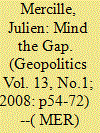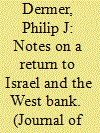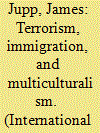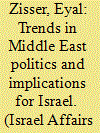|
|
|
Sort Order |
|
|
|
Items / Page
|
|
|
|
|
|
|
| Srl | Item |
| 1 |
ID:
105829


|
|
|
|
|
| Publication |
2011.
|
| Summary/Abstract |
The traditionally close relationship between China and Pakistan cooled off somewhat with the end of the Cold War, mainly due to China's efforts to improve its relations with India and the disappearance of the Soviet threat. While China has continued to pursue its rapprochement with India after 9/11, developments since 9/11 have reinforced the security foundations of Sino-Pak relations and have consequently reversed the downward trend in the relationship leading to enhanced cooperation in a number of areas. US involvement in Central Asia and deepening Indo-US collaboration have further increased Pakistan's strategic importance for China. Islamabad also occupies a prominent position in Beijing's energy security and its efforts to stabilize Xinjiang.
|
|
|
|
|
|
|
|
|
|
|
|
|
|
|
|
| 2 |
ID:
081555


|
|
|
|
|
| Publication |
2008.
|
| Summary/Abstract |
US politics seems to be chronically afflicted with high levels of military spending justified by security "crises", the current upsurge under the Bush administration being only the latest episode in a long series. This paper addresses the question, "Why are the levels of US military spending so high?" to which it provides a "radical" geographical answer. Although in the conclusion I offer thoughts on how my points apply to the current situation, I do not claim that the analysis applies directly to the post-war period as a whole, but only to that of the case study, the bomber and missile gaps of 1955-1961, two successive "crises" that led to increases in defence expenditures. I argue that although the "immediate" causes of the "gaps" and ensuing military spending may be found at the national and local scales, some of their fundamental roots are to be located in US post-war plans to organise the global space of the capitalist world economy. I will show how such plans?-?as found in important declassified documents like NSC-68 and the Gaither Report as well as those related to the Vietnam War and counterinsurgency policies?-?explicitly called for military spending to maintain American hegemony. Moreover, those documents reveal geographical assumptions reminiscent of Mackinder's geopolitics, hegemony and world-systems theories. Finally, examining the geopolitics and geoeconomics of US military spending makes a contribution to a subject to which geographers have paid only limited attention
|
|
|
|
|
|
|
|
|
|
|
|
|
|
|
|
| 3 |
ID:
098111


|
|
|
|
|
| Publication |
2010.
|
| Summary/Abstract |
The following document, previously unpublished, was written in March 2010 by a recently retired ( June 2009) U.S. Army colonel with thirty years experience in the Middle East, including tours of duty and advisory roles (in both military/security and civilian domains) from North Africa to the Persian Gulf. The subject of the informal report is the author's first two trips as a "civilian" to Israel and the West Bank, where he had served two tours of duty, most recently as U.S. military attaché in Tel Aviv during Israel's 2005 unilateral disengagement from Gaza and the formation of the U.S. Security Coordinator's (USSC) mission to reform Palestinian Authority (PA) security forces.
Written as an internal document for military colleagues and government circles, the report has been circulating widely-as did the author's earlier briefings on travel or missions in Syria, Lebanon, Jordan, Egypt, and especially Iraq-among White House senior staff, the Joint Chiefs of Staff, the Defense Intelligence Agency, CENTCOM (U.S. Central Command), EUCOM (U.S. European Command), and the USSC team.
|
|
|
|
|
|
|
|
|
|
|
|
|
|
|
|
| 4 |
ID:
075852


|
|
|
| 5 |
ID:
075810


|
|
|
|
|
|
|
|